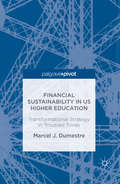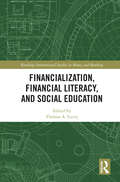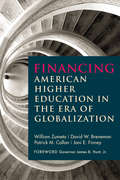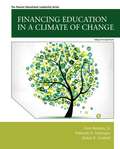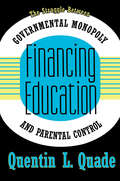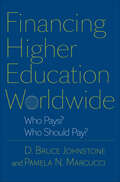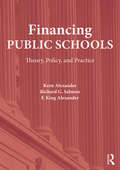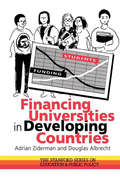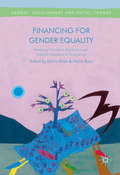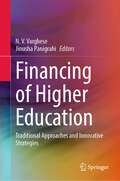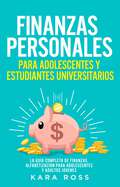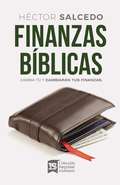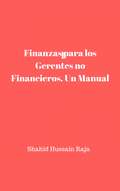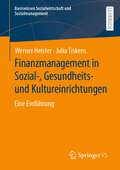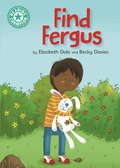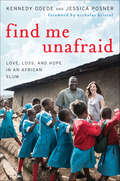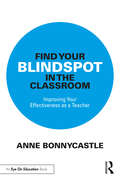- Table View
- List View
Financial Sustainability in US Higher Education
by Marcel J. DumestreThis book is a practical approach to insuring financial sustainability of US colleges, presented through the lens of organizational strategic thinking. The book does not simply offer models of how colleges can become financially sustainable in cost cutting, online education, international student recruiting, etc. Rather, it presents a succinct historical perspective of how foundational problems emerged, how some universities transformed themselves, and introduces an organizational strategic thinking process that can be used to develop unique solutions for almost any institution.
Financial and Managerial Accounting: Information for Decisions
by John J. Wild Ken W. ShawBuilding on the success of the best-selling Fundamental Accounting Principles text, authors John Wild, Kenneth Shaw, and Barbara Chiappetta created Financial and Managerial Accounting: Information for Decisions to provide a corporate perspective and balanced coverage in this growing course area. With its step-by-step approach, FinMan streamlines complex accounting processes and helps students build confidence by mastering key concepts and procedures. Chapter opening vignettes using dynamic entrepreneurs appeal to all students and show the relevance of accounting. Students are encouraged to think like a businessperson and apply what they learn. A wide variety of assignments provide instructors with materials to teach, assess, and challenge students on several levels. Join your colleagues and students that have used this best-selling learning system to advance their education and careers.
Financialization, Financial Literacy, and Social Education (Routledge International Studies in Money and Banking)
by Thomas A. LuceyThe objective of this book is to prompt a re-examination of financial literacy, its social foundations, and its relationship to citizenship education. The collection includes topics that concern indigenous people’s perspectives, critical race theory, and transdisciplinary perspectives, which invite a dialogue about the ideologies that drive traditional and critical perspectives. This volume offers readers opportunities to learn about different views of financial literacy from a variety of sociological, historical and cultural perspectives. The reader may perceive financial literacy as representing a multifaceted concept best interpreted through a non-segregated lens. The volume includes chapters that describe groundings for revising standards, provide innovative teaching concepts, and offer unique sociological and historical perspectives. This book contains 13 chapters, with each one speaking to a distinctive topic that, taken as a whole, offers a well-rounded vision of financial literacy to benefit social education, its research, and teaching. Each chapter provides a response from an alternative view, and the reader can also access an eResource featuring the authors’ rejoinders. It therefore offers contrasting visions about the nature and purpose of financial education. These dissimilar perspectives offer an opportunity for examining different social ideologies that may guide approaches to financial literacy and citizenship, along with the philosophies and principles that shape them. The principles that teach and inform about financial literacy defines the premises for base personal and community responsibility. The work invites researchers and practitioners to reconsider financial literacy/financial education and its social foundations. The book will appeal to a range of students, academics and researchers across a number of disciplines, including economics, personal finance/personal economics, business ethics, citizenship, moral education, consumer education, and spiritual education.
Financing American Higher Education in the Era of Globalization
by Joni E. Finney James B. Hunt Jr. William Zumeta Patrick M. Callan David W. BrenemanThis ambitious book grows out of the realization that a convergence of economic, demographic, and political forces in the early twenty-first century requires a fundamental reexamination of the financing of American higher education. The authors identify and address basic issues and trends that cut across the sectors of higher education, focusing on such questions as how much higher education the country needs for individual opportunity and for economic viability in the future; how responsibility for paying for it is currently allocated; and how financing higher education should be addressed in the future.
Financing American Higher Education in the Era of Globalization
by Joni E. Finney William Zumeta Patrick M. Callan David W. BrenemanThis ambitious book grows out of the realization that a convergence of economic, demographic, and political forces in the early twenty-first century requires a fundamental reexamination of the financing of American higher education. The authors identify and address basic issues and trends that cut across the sectors of higher education, focusing on such questions as how much higher education the country needs for individual opportunity and for economic viability in the future; how responsibility for paying for it is currently allocated; and how financing higher education should be addressed in the future.
Financing Education In A Climate Of Change (Twelth Edition)
by Vern R. Brimley Deborah A. Verstegen Rulon R. GarfieldThis is the eBook of the printed book and may not include any media, website access codes, or print supplements that may come packaged with the bound book. This new edition of the classic text in the field of school finance retains the practical tone and superior presentation that made the previous editions best sellers, while presenting the most up-to-date information and material available on key subjects. Here readers get a firm, balanced look of all facets of financing education, clarified and reinforced through numerous clear tables, figures, and key concept lists, and a tone and presentation that illustrates even the most difficult concepts. The new Twelfth Edition of Financing Education in a Climate of Change includes information on hot button topics such as the economics of education, recent court decisions 50-state comparison tables, the Common Core State Standards, and the ongoing debate about school vouchers, tax credits, and charter schools.
Financing Education: The Struggle between Governmental Monopoly and Parental Control
by Quentin QuadeLack of family structure, violence in the schools, and overcrowded classrooms spur a never-ending cry for "reforms" to confront such issues. Quentin L. Quade cuts through the alarming din to what he feels is the real heart of the matter- the ways society assigns tax dollars dedicated to education, what he refers to as educational finance monopoly or EFM.In the United States, contrary to the practice of many other modern democracies, tax dollars are assigned by state bureaucratic structures to each state's own schools. Such a system spawns structures and personnel that stay in place irrespective of merit, and keep control of all finances. An alternative to EFM, at work in various other democracies, is programs aimed to permit school choice without financial penalty. In such systems, parents determine the allocation of education-dedicated tax dollars, and can select schools most suited to their children. In contrast, under EFM state schools are sheltered from competitive incentives to excel, to make themselves choiceworthy. And independent schools are damaged because they are deprived of the resources they would have if parents were free to choose.On the one side, defenders of EFM want political control for financial advantage and to block efforts to change. On the other side, critics want parents to be free to decide the educational environment for their children. Quade maintains that EFM is fundamentally injurious to children, parents, and the nation; that it is maintained by political defenses of financial interests, not for reasons of educational merit; and that school choice without financial penalty would create better educational conditions and outcomes.Financing Education examines the major problems of American K-12 education, establishes the casual connections with EFM, offers school choice without financial penalty as a powerful and obvious cure, and examines several American school choice proposals. It will be of interest to policymakers, policy analysts, educators, taxpayers, parents, and all persons concerned about American's educational quality.
Financing Higher Education Worldwide: Who Pays? Who Should Pay?
by D. Bruce Johnstone Pamela N. MarcucciNo issue in higher education is as salient, or as controversial, as finance. As demand for higher education around the world grows, so do the costs associated with it, especially as governments shoulder less of the burden. Tuition fees rise and student loan debt grows. Who pays for these surging costs? Who should pay? D. Bruce Johnstone and Pamela N. Marcucci examine the universal phenomenon of cost-sharing in higher education—where financial responsibility shifts from governments and taxpayers to students and families. They find that growing costs for education far outpace public revenue streams that once supported it. Even with financial aid and scholarships defraying some of these costs, students are responsible for a greater share of the cost of higher education.Featuring comprehensive economic and policy data, the authors' international comparative approach shows how economically diverse countries all face similar cost-sharing challenges. So, who should pay for higher education? While cost-sharing is both politically and ideologically debated, Johnstone and Marcucci contend that, for almost all countries, it is imperative for the financial health of colleges and universities, bringing better efficiency, equity, and responsiveness. Financing Higher Education Worldwide combines sophisticated economic explanations with sensitive political and cultural analyses of the financial pressures facing higher education throughout the world.
Financing Higher Education in Africa
by World BankThe training and development of human capital in Sub-Saharan Africa (SSA) will help countries in the region diversify their economies, carry out economic transformation, and support sustainable growth. Higher education plays a key role in training qualified individuals who will be able to implement new technologies and use innovative methods to establish cost-efficient and effective enterprises and institutions. However, in order for SSA to reap the benefits of this investment in human capital, higher education institutions must secure financing to provide quality training and sound professional prospects to their students. Currently, tertiary education development is unsustainable-resources per student are declining and the quality of education is affected. These issues are particularly pressing in times of financial global crisis, when available resources for tertiary education tend to diminish. The impact of the crisis that started in 2008 provides a clear illustration of the need to explore innovative ways to diversify and secure financing for higher education in SSA. 'Financing Higher Education in Africa' provides a comprehensive overview of higher education financing in SSA. The book begins with an explanation of the fundamental problems faced by higher education institutions and students in SSA, namely the combined pressure of a rapid growth in demand and a growing scarcity of public resources, and it presents the dramatic consequences of these trends on quality. The book then turns to analyzing and comparing the current funding policies in SSA countries and it provides recommendations for improvement. Finally, the book examines the alternatives to the status quo and the policy tools needed to both diversify resources and allocate them based on performance. It will be of great interest to governments, universities, research institutions, and international organizations throughout the region.
Financing Public Schools: Theory, Policy, and Practice
by Kern Alexander Richard G. Salmon F. King AlexanderFinancing Public Schools moves beyond the basics of financing public elementary and secondary education to explore the historical, philosophical, and legal underpinnings of a viable public school system. Coverage includes the operational aspects of school finance, including issues regarding teacher salaries and pensions, budgeting for instructional programs, school transportation, and risk management. Diving deeper than other school finance books, the authors explore the political framework within which schools must function, discuss the privatization of education and its effects on public schools, offer perspectives regarding education as an investment in human capital, and expertly explain complex financial and economic issues. This comprehensive text provides the tools to apply the many and varied fiscal concepts and practices that are essential for aspiring public school administrators who aim to provide responsible stewardship for their students. Special Features: "Definitional Boxes" and "Key Terms" throughout chapters enhance understanding of difficult concepts. Coverage of legal, political, and historical issues provides a broader context and more complex understanding of school finance. Offers in-depth exploration of business management of financial resources, including fiscal accounting, school facilities, school transportation, financing with debt, and the nuances of school budgeting techniques.
Financing Universities in Developing Countries
by Adrian Ziderman Douglas AlbrechtInadequate public funding means that governments in developing countries are continually working to find ways of expansion to meet the growth demand for higher education.; This book considers the effectiveness of government funding methods in developing quality and efficiency in higher education systems in developing countries, and looks at policy measures taken to widen the funding base including raising tuition fees, student loan programmes, graduate taxes, industry-education links and national service programmes.; Taking information from around the world and drawing on successful practice in developed countries, this volume should be of interest to specialists and researchers in education economics and economic development, academics in general education and those involved in the finance and administration of higher education.
Financing for Gender Equality
by Zohra Khan Nalini BurnThis collection of essays addresses the glaring gap between policy commitments and actual investments in gender equality, ranging across sectors and focusing on development aid, peace-building and climate funds. Casting a spotlight on the application of gender-responsive budgeting in public budgetary policies, systems and processes, the contributions to this volume explore the chequered trajectories of these efforts in Africa, the Asia-Pacific, Latin America and Andaluc#65533;a. Critiquing systems of finance, from adherence to neo-liberal macroeconomic fundamentals which prioritise fiscal austerity, the book makes a compelling case for reframing and re-prioritizing budgets to comply with human rights standards, with a particular view to realizing women's rights. The authors highlight the paltry funding for women's rights organizations and movements and examine the prospects for making financing gender responsive. The specific policy, strategy and technical recommendations and the connections across silos which articulate the authors' suggested operational levers will appeal to researchers, practitioners, students, policymakers, gender equality and human rights activists alike.
Financing of Higher Education: Traditional Approaches and Innovative Strategies
by N. V. Varghese Jinusha PanigrahiThis book reviews and analyses higher education financing and explores the innovative ways by both public higher education and private higher education institutes in the context of globalization, with India, Russia and Tanzania as a case study. It examines the diverse policy discourses which greatly influence the higher education systems based on evidence-based research. This book is arranged into four major themes. Part 1 deals with the various possible modes of financing of higher education, such as the credit market and voucher system. Part 2 deals with strategies to mobilize the resources. Part 3 deals with innovative and sustainable approaches to financing private higher education institutions. Part 4 discusses the policies and limitations with external financing of higher education. It is an interesting collection of various themes in different chapters by serious researchers. It is an excellent read for students, educators and policymakers interested in alternative and innovative practices in higher education financing. It is a highly informative book for researchers providing insights on how social and political dynamics impact higher education financing.
Finanzas Personales Para Adolescentes y Estudiantes Universitarios: La guía completa de finanzas. Alfabetización para adolescentes y adultos jóvenes
by Kara Ross¿Sos un estudiante de secundaria, pronto a graduarte y a punto de ingresar a la universidad o empezar a trabajar a tiempo completo? ¿Estás en la universidad y no sabes cómo administrar el dinero que tenes mientras estudias? ¿Eres un padre buscando una buena introducción sobre finanzas personales para tu hijo o hija? ¡Si querés aprender cómo administrar mejor tu dinero como joven adulto, seguí leyendo! En las escuelas de todo el mundo falta un curso formal de alfabetización financiera, y en su lugar se enfocan en enseñar habilidades arbitrarias que pueden o no ser relevantes para la vida diaria. Como resultado, tenemos adultos jóvenes financieramente analfabetos que pueden resolver ecuaciones cuadráticas y recordar la estructura de una planta, pero no tienen idea sobre los préstamos que toman o cómo funcionan los impuestos. Este libro tiene como objetivo llenar ese vacío en el sistema educativo al introducir a adolescentes y estudiantes universitarios a conceptos financieros relevantes, para ampliar su comprensión funcional y ayudarlos a tomar decisiones informadas en cada etapa de sus vidas. Puede parecer abrumador al principio, pero aprender estas habilidades es absolutamente posible. En este libro, aprenderás lo siguiente: •Términos y conceptos financieros esenciales y cómo administrar tus cuentas financieras. •Qué hacer con tu dinero y cómo hacerlo crecer para alcanzar la libertad financiera. •Cómo priorizar tus gastos y enfocarte más en las necesidades y no en los deseos. •Cómo ahorrar e invertir dinero para prepararte para compromisos futuros, como el matrimonio y la familia. •Los errores y aciertos en la administración del dinero, para que no tengas problemas al hacer crecer tus ahorros. •Opciones de inversión para generar más dinero y qué podés hacer para enfrentar las deudas.
Finanzas bíblicas: Cambia tú y cambiarán tus finanzas
by Héctor SalcedoEn un mar de consejos financieros, hay tan solo un camino para resolver, de una vez por todas, tus problemas de dinero. Transforma tu futuro financiero al permitir que estas sencillas verdades bíblicas penetren en tu corazón y cambien tu perspectiva respecto a las finanzas personales.Muchos de nosotros, si no todos, hemos enfrentado estrés financiero. En Finanzas bíblicas, el renombrado pastor y economista Héctor Salcedo, nos desafía a ver más allá de los consejos financieros tradicionales, los cuales a menudo producen solo cambios pasajeros, y más bien nos anima a cambiar nosotros, en nuestro interior; renovar nuestro entendimiento y permitir que esto informe nuestras prioridades y nuestras acciones. En Finanzas bíblicas, Héctor Salcedo nos lleva por una travesía bíblica que propone:Mostrar que las dificultades financieras tienen, en su mayoría, un origen que responde a un desvío del carácter.Exponer nuestra sutil pero fuerte inclinación a la avaricia; es decir, a acumular posesiones materiales.Desenmascarar la razón de dicha avaricia, que no es más que nuestra equivocada idea de que la abundancia de bienes produce plenitud de vida.Demostrar que la generosidad, lejos de «restarnos», nos suma.Mostrar cómo manejar las finanzas de forma tal que honremos a Dios. El libro concluye con algunos consejos prácticos relacionados con:El incremento de tus ingresosLa evaluación de oportunidades de negocios que incluyen las compañías de mercadeo de multinivelLas inversionesLa criptomonedaLa creación de un presupuesto familiarEl endeudamiento por la compra de una casa o un vehículoMientras muchos se enfocan en resolver sus problemas financieros siguiendo el consejo de gurús o prueban la más reciente herramienta de presupuestos personales, el cambio duradero empieza en nuestro interior. Permite que estas verdades bíblicas penetren en tu corazón y transformen tu perspectiva sobre las finanzas; y cambia así, tu futuro financiero.Biblical FinancesIn a sea of financial advice, there is the only one way to truly solve your money problems. Transform your financial future by allowing these simple Biblical truths to penetrate your heart and shift your view on personal finances.Many, if not all of us, at one time or another, face financial stress. &“Biblical Finances,&” from renowned Pastor and economist, Hector Salcedo, challenges us to look beyond the traditional financial advice, which often produces only temporary change. Instead, the author encourages us to aim for lasting change by going on a Biblical journey with him.In this book, Hector will show you:How your financial difficulties are often directly tied to your characterHow saving is for the wiseHow your desire for material possessions is often based on the misguided idea that owning these things will bring happinessHow contentment can cure your financial deficitHow generosity ADDS to your life and does not take away The book concludes with some practical advice related to:Increasing your incomeEvaluating business opportunities including multi-level marketing companiesInvestingCryptocurrencyCreating a family budgetGetting into debt with a home or auto purchase
Finanzas para los Gerentes no Financieros. Un Manual
by Saul Agis GarciaEl presente libro nos muestra una más de las maravillosa obras del autor en relación al tema de las finanzas, en específico el enfoque que él mismo le da al mencionar su experiencia como servidor público de Pakistán. Un libro por demás interesante que se presenta al lector de habla hispana.
Finanzen für Nicht-Finanzfachleute: Ein Handbuch
by Shahid Hussain RajaObwohl dieses Handbuch in erster Linie für das mittlere Management eines Unternehmens geschrieben wurde, ist es auch für leitende Angestellte im öffentlichen oder privaten Sektor oder sogar für gemeinnützige Nichtregierungsorganisationen (NRO) nützlich. Es ist auch für diejenigen gedacht, die in ihrer akademischen Laufbahn Wirtschaftswissenschaften studiert haben, aber nach ihrem Eintritt in den Dienst die finanziellen Konzepte und Begriffe vergessen haben. Da das betriebswirtschaftliche Wissen und die Erfahrungen größenneutral sind, werden diejenigen, die Eigentümer von KMU sind oder in KMU arbeiten, das Buch ebenso geeignet und nützlich finden. Nach der gründlichen Lektüre dieses Buches sollten Sie in der Lage sein, die Bedeutung des Finanzwesens, seine Bedeutung für die Stabilität und das Wachstum eines Unternehmens, die grundlegenden Finanzkonzepte und den bei der Finanzanalyse und Entscheidungsfindung verwendeten Fachjargon zu verstehen und bei Bedarf zu erklären. Darüber hinaus lernen Sie die drei wichtigsten Jahresabschlüsse kennen und erfahren, wie Sie die Informationen interpretieren und nutzen können, um die historische Leistung Ihres Unternehmens zu messen und die künftige Entwicklung zu planen. Nicht zuletzt werden Sie die Bedeutung des Budgetierungsprozesses und die Rolle der Unternehmensfinanzen bei der Formulierung und Umsetzung einer Wettbewerbsstrategie verstehen lernen, ebenso wie die grundlegende Natur der Kosten, der Bruttomarge und der Gewinnschwelle sowie die Auswirkungen gängiger Preisgestaltungsmethoden auf Bruttomarge und Gewinn.
Finanzmanagement in Sozial-, Gesundheits- und Kultureinrichtungen: Eine Einführung (Basiswissen Sozialwirtschaft und Sozialmanagement)
by Werner Heister Julia TiskensDas Lehrbuch führt anschaulich und verständlich in grundlegende Methoden und Instrumente ein, um definierte Aufgaben im Finanzmanagement zu erledigen, Informationen aufzubereiten und Entscheidungen vorbereiten und treffen zu können. Über relevantes Fachwissen hinaus werden unerlässliche Kompetenzen wie die Fähigkeit, Sachverhalte und Probleme zu durchdringen oder im Rahmen von Wirtschaftlichkeitsrechnungen Sachverhalte treffend beurteilen zu können.
Finchosaurus
by Gail DonovanFinch has trouble paying attention in school. He’s just too busy dreaming about uncovering a dinosaur fossil and naming a new species after himself—until he digs up a note in the fifth-grade class garden with the word HELP on it. He is determined to come to the aid of the mystery note-writer. But when the quest turns out to be harder than expected, Finch risks losing two things that he really wants—his best friend Noah, and a field trip to Dinosaur State Park. Acclaimed author Gail Donovan gets inside the hearts and minds of fifth graders on this journey told with unexpected humor and impressive insight.
Find Fergus: Independent Reading Turquoise 7 (Reading Champion #692)
by Elizabeth DaleImran has never been apart from his toy rabbit Fergus. So when Fergus goes missing on a sleepover at Aunty Caroline's house, Imran is determined to find him.Reading Champion offers independent reading books for children to practise and reinforce their developing reading skills.Fantastic, original stories are accompanied by engaging artwork and a reading activity. Each book has been carefully graded so that it can be matched to a child's reading ability, encouraging reading for pleasure.Independent Reading Turquoise 7 stories are perfect for children aged 5+ who are reading at book band 7 (Turquoise) in classroom reading lessons.
Find It in the Bible for Women
by Bob PhillipsFANTASTIC, FAITH-BUILDING, FUN FACTS FROM THE BIBLE Did you know the Bible contains stories about 107 nameless women, as well as 26 teachings on how to live forever? How would you like to know where to find 61 different encouragements specifically designed to help you tackle a problem? Find It in the Bible for Women is a fun, quick reference guide intended to expand your knowledge of the Bible and to offer practical, workable guidance for your life. You'll even find a list of 161 Who's Who Women. Filled with Scripture references, this book is a simple, easy-to-use resource for women of all ages. Read through the pages of this book and be encouraged, inspired, and intrigued. From Bad Hair Days and Bible Blessings to Help for Worrywarts and a Healthy Self-Image, you'll find it in the Bible -- inspiration, hope, answers, and a whole lot of fun.
Find Me Unafraid: Love, Loss, and Hope in an African Slum
by Jessica Posner Kennedy Odede"Kennedy is living proof that individuals can lead themselves, and their communities, out of poverty." -Salma Hayek Pinault, Time 100Find Me Unafraid tells the uncommon love story between two uncommon people whose collaboration sparked a successful movement to transform the lives of vulnerable girls and the urban poor. With a Foreword by Nicholas Kristof.This is the story of two young people from completely different worlds: Kennedy Odede from Kibera, the largest slum in Africa, and Jessica Posner from Denver, Colorado. Kennedy foraged for food, lived on the street, and taught himself to read with old newspapers. When an American volunteer gave him the work of Mandela, Garvey, and King, teenaged Kennedy decided he was going to change his life and his community. He bought a soccer ball and started a youth empowerment group he called Shining Hope for Communities (SHOFCO). Then in 2007, Wesleyan undergraduate Jessica Posner spent a semester abroad in Kenya working with SHOFCO. Breaking all convention, she decided to live in Kibera with Kennedy, and they fell in love.Their connection persisted, and Jessica helped Kennedy to escape political violence and fulfill his lifelong dream of an education, at Wesleyan University.The alchemy of their remarkable union has drawn the support of community members and celebrities alike—The Clintons, Mia Farrow, and Nicholas Kristof are among their fans—and their work has changed the lives of many of Kibera’s most vulnerable population: its girls. Jess and Kennedy founded Kibera’s first tuition-free school for girls, a large, bright blue building, which stands as a bastion of hope in what once felt like a hopeless place. But Jessica and Kennedy are just getting started—they have expanded their model to connect essential services like health care, clean water, and economic empowerment programs. They’ve opened an identical project in Mathare, Kenya’s second largest slum, and intend to expand their remarkably successful program for change.Ultimately this is a love story about a fight against poverty and hopelessness, the transformation made possible by a true love, and the power of young people to have a deep impact on the world.
Find The Girl
by Lucy Connell Lydia ConnellThe perfect summer read for fans of Girl Online and Rainbow Rowell! ----- Falling for your best friend's love interest is bad...Falling for your twin's is catastrophic.As kids, Nina and Nancy were inseparable. As teenagers, not so much...Where Nancy is popular, an Instagram star, and obsessed with boy band heartthrob Chase, Nina is shy; a talented classical musician, and shuns the spotlight that her sister thrives in.But when the wrong twin unwittingly ends up at the centre of a romantic social media storm, the bonds of twin-ship will be tested like never before... Written in collaboration with Katy Birchall, #FINDTHEGIRL is a very modern twist on a Cinderella story.
Find Your Artistic Voice: The Essential Guide to Working Your Creative Magic
by Lisa CongdonAn artist's unique voice is their calling card. It's what makes each of their works vital and particular. But developing such singular artistry requires effort and persistence. Bestselling author, artist, and illustrator Lisa Congdon brings her expertise to this guide to the process of artistic self-discovery. Featuring advice from Congdon herself and interviews with a roster of established artists, illustrators, and creatives, this one-of-a-kind book will show readers how to identify and nurture their own visual identity, navigate the influence of artists they admire, push through fear and insecurity, and appreciate the value of their personal journey.
Find Your Blindspot in the Classroom: Improving Your Effectiveness as a Teacher
by Anne BonnycastleFind Your Blindspot in the Classroom offers both an alternative and a complement to standard professional development, instructional coaching, and teacher evaluation. Author Anne Bonnycastle reveals 10 common blindspots that can be challenging for teachers, whether you are in year one or 20. She provides practical strategies to help you find your own blindspot and then shows how you can improve that area by incorporating a professional practice focus.The book’s unique, no-frills, personalized approach will help you improve your classroom instruction, focusing on the effect that your teaching has on students. The research-supported strategies will help you increase your effectiveness, regardless of the supports available within your school.Whether you have a mentor or coach guiding you or are using the book on your own, this book will be your trusty guide as you grow on your journey as an educator.
